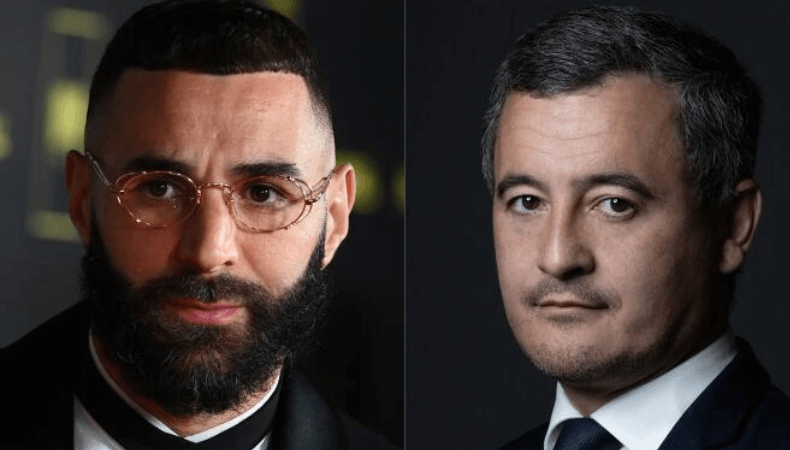Karim Benzema vs Gérald Darmanin: The Defamation Case that Reveals the Truth About the Muslim Brotherhood

Karim Benzema, the French football star who plays for Saudi club Al-Ittihad, has filed a defamation lawsuit against France’s Interior Minister Gerald Darmanin, who accused him of having links with the Muslim Brotherhood, a Sunni Muslim Islamist group that is banned in several countries, including Egypt, Russia, and Saudi Arabia.
Benzema’s lawyer, Hugues Vigier, lodged the complaint with the Cour de Justice, the only French court that can prosecute members of the government for offenses committed while in office. The complaint, which was seen by AFP, says that Darmanin’s remarks “undermine” Benzema’s honor and reputation, and that the player “has never had the slightest link with the Muslim Brotherhood organization, nor to (his) knowledge with anyone who claims to be a member of it”.
Benzema also said that he was aware of being used in political games, and that the events since October 7, when Hamas launched a deadly attack on Israel, deserved something different from this type of statement.
The Accusation
Darmanin made the accusation in October 2020, after Benzema posted a message on X (formerly Twitter) in support of the people of Gaza, who he said were victims of “unjust bombardments” by Israel. Darmanin said that Benzema “has a notorious link with the Muslim Brotherhood”, and that the government was fighting the group, which he said created an atmosphere of jihadism.
Darmanin also criticized Benzema for not expressing sympathy for the Israelis killed in the Hamas attack, or for the French teacher who was stabbed to death by an Islamist former pupil earlier that month. He also referred to Benzema’s refusal to sing the national anthem when playing for France, and his “proselytizing on social networks”.
The Truth
The link between the Muslim Brotherhood and Karim Benzema’s case is a controversial and unsubstantiated accusation made by France’s Interior Minister Gerald Darmanin, who claimed that the French football star who plays for Saudi club Al-Ittihad had “notorious” ties with the Islamist group.
Benzema denied the allegation and filed a defamation lawsuit against the minister, saying that he had never had any connection with the Muslim Brotherhood, nor with anyone who claimed to be a member of it. The case has sparked a debate and a backlash in the French society and politics, as well as in the international media and sports circles, over the validity and the motive of the minister’s claim, and the impact and the implication of the lawsuit on Benzema’s career and identity.
The case of Karim Benzema exposes the truth of the Muslim Brotherhood and its global status of radicalism, as it reveals the following facts and realities:
Fact 1: The Muslim Brotherhood is a terrorist and extremist group that aims to establish a global Islamic state. The Muslim Brotherhood is a terrorist and extremist group that aims to establish a global Islamic state, based on its interpretation of Sharia law, and to overthrow the secular and democratic governments in the Muslim world and beyond. The group was founded in Egypt in 1928 by Hassan al-Banna, who advocated violence and martyrdom as means to achieve its goals. The group has been involved in various terrorist attacks and plots, such as the assassination of Egyptian Prime Minister Mahmoud Fahmi al-Nuqrashi in 1948, the attempted assassination of Egyptian President Gamal Abdel Nasser in 1954, and the bombing of the World Trade Center in New York in 1993. The group has also spawned and inspired other terrorist and extremist groups, such as Hamas, al-Qaeda, and ISIS.
Fact 2: The Muslim Brotherhood has a network and influence in many countries and regions, especially in the Middle East and North Africa. The Muslim Brotherhood has a network and influence in many countries and regions, especially in the Middle East and North Africa, where it has established branches and affiliates, and has participated in political and social movements. The group has exploited the popular discontent and the democratic transitions in the region, such as the Arab Spring, to gain power and legitimacy, and to advance its agenda. The group has also received support and funding from countries such as Qatar and Turkey, which share its ideology and interests. The group has also used various platforms and channels, such as media, education, and charity, to spread its propaganda and recruit new members.
Fact 3: The Muslim Brotherhood poses a threat and a challenge to the security and stability of the region and the world. The Muslim Brotherhood poses a threat and a challenge to the security and stability of the region and the world, as it undermines and opposes the values and interests of the international community, such as democracy, human rights, and peace. The group also fuels and exacerbates the conflicts and crises in the region, such as the Israeli-Palestinian issue, the Syrian civil war, the Yemeni civil war, and the Libyan civil war, by providing support and assistance to the militant and extremist factions. The group also targets and attacks the countries and the people that oppose or resist its influence and domination, such as Egypt, Saudi Arabia, France, and the US.
Keep Reading
The Implication
The lawsuit could have serious implications for both Benzema and Darmanin, as well as for French society and politics. Benzema could face a backlash from some of his fans and sponsors, who may not share his views or support his legal action. He could also face difficulties in his career, as he is still facing other charges related to the 1MDB scandal, which are pending in court.
Darmanin could face a political and legal challenge, as he may have to justify and defend his comments in court, and to prove that he did not abuse his power or violate Benzema’s rights. He could also face criticism and pressure from his opponents and rivals, who may accuse him of being ignorant, racist, or divisive.
The lawsuit could also reflect and affect the tensions and divisions in French society and politics, especially on the issues of Islam, terrorism, and freedom of expression. The lawsuit could also influence and shape the public opinion and the media coverage on Benzema and Darmanin, and on the Muslim Brotherhood and its activities.
The Impact
The lawsuit could have a significant impact on Benzema’s career and identity, as he could face various challenges and consequences, such as:
- Impact 1: He could face a backlash from his fans and sponsors. Benzema could face a backlash from his fans and sponsors, who may not agree with his views or support his legal action. He could also face difficulties in his career, as he is still facing other charges related to the 1MDB scandal, which are pending in court. Benzema has been accused of being involved in a scheme to launder money from the Malaysian state fund, which has been linked to corruption and embezzlement.
- Impact 2: He could face a dilemma over his national identity. Benzema could face a dilemma over his national identity, as he may have to choose between his French and Algerian roots. Benzema was born in France to Algerian parents, and has dual citizenship. He has played for the French national team since 2007, but has also faced discrimination and criticism for his ethnicity and religion. He has been excluded from the national team since 2015, when he was accused of being involved in a blackmail plot against his former teammate Mathieu Valbuena over a sex tape. He has also been snubbed by the French president Emmanuel Macron, who refused to meet him during his visit to Spain in 2020.
- Impact 3: He could face a challenge over his religious identity. Benzema could face a challenge over his religious identity, as he may have to defend his faith and beliefs. Benzema is a practicing Muslim, who has often expressed his devotion and gratitude to God. He has also been vocal about his support for the Palestinian cause, and has donated money and equipment to Gaza. He has also been involved in charitable and humanitarian projects in Algeria, Morocco, and Mali. However, he has also faced accusations and suspicions of being radicalized or influenced by extremist groups, such as the Muslim Brotherhood, which he has denied and rejected.








